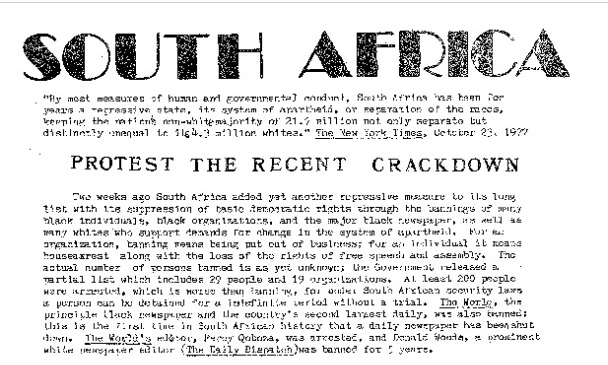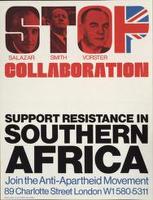I. Origins
The white supremacist National Party codified the apartheid, or "separate development," system in South Africa in 1948. These apartheid policies, which remained in place until 1994, included bans on interracial marriage, restrictions regarding where different races could live and own property, and registration with the government according to racial group. Protests against the apartheid system quickly emerged within South Africa, in particular the multiracial Defiance Campaign, launched in 1951 under the leadership of the African National Congress (ANC). For decades, the South African government confronted a prolonged resistance struggle, beginning with nonviolent protests but becoming more militarized as the white supremacist regime responded with violent crackdowns and the imprisonment or exile of prominent anti-apartheid leaders.
Widespread opposition also arose outside of South Africa in the form of an international movement against the apartheid regime, with London a major center of human rights activism. The international anti-apartheid movement also targeted colonial regimes in Angola, Mozambique, Namibia, and Zimbabwe. In Britain, a group of South African exiles organized a boycott month in March 1960, calling on consumers to refrain from buying any South African products. Local councils and student unions banned South African fruits and cigarettes. The boycott protests in Britain expanded into a larger anti-apartheid movement after the deadly events at Sharpeville, including a protest march by more than 15,000 people in London. However, despite the success of the boycott, the British government initially blocked wider economic sanctions, due to the belief that trade and investment in South Africa was vital to the British economy.
Global condemnation of apartheid became more prevalent in the 1970s. The General Assembly of the United Nations denounced the apartheid system as a "crime against humanity" in 1973, and the UN Security Council voted to impose a military embargo on South Africa in 1976. The 1976 events at Soweto, in which the police doused thousands of black children with tear gas and bullets for demonstrating against the requirement to learn the Afrikaans language, further shocked the world and led to the rapid growth of anti-apartheid campaigns in many countries, including the United States.
In the U.S., civil rights organizations spoke out against the apartheid system during the 1950s and 1960s, while black nationalist groups expressed solidarity with the resistance struggle in sub-Saharan Africa. The proliferation of anti-apartheid activism on American campuses during the mid-1970s marked a new phase in the movement. Mass actions at American universities intensified in response to a series of atrocities in South Africa and the efforts of human rights organizations to bring the issue to the attention of the American public. The anti-apartheid movement of the 1970s and 1980s focused on the strategy of divestment, selling off business interests or investments in corporations that operated in South Africa, in order to put international pressure on the apartheid government. This movement brought together students, community organizations, and religious, labor, and civil rights groups. On the University of Michigan's campus, protests against apartheid occurred sporadically in the late 1960s and early 1970s but began in earnest in the mid-1970s, especially following the Soweto Uprising of 1976, when organizations such as the Southern African Liberation Committee (SALC) began to raise awareness of the apartheid regime and started working with activists at other universities to develop the infrastructure supporting the divestment campaign. In the 1977 flyer at the top of this page, SALC informed UM students that "OUR money is going to support one of the most racist and repressive regimes on this planet" and issued the "demand that U-M break all ties with South Africa immediately!"
Citations for this page (individual document citations are on the full source pages):
"Forward to Freedom: The History of the British Anti-Apartheid Movement, 1959-1994," <http://www.aamarchives.org>.
Francis Njubi Nesbitt, Race for Sanctions: African Americans against Apartheid, 1946-1994 (Bloomington: Indiana University Press, 2004).
"South Africa: Overcoming Apartheid, Building Democracy," <http://overcomingapartheid.msu.edu/index.php>.


